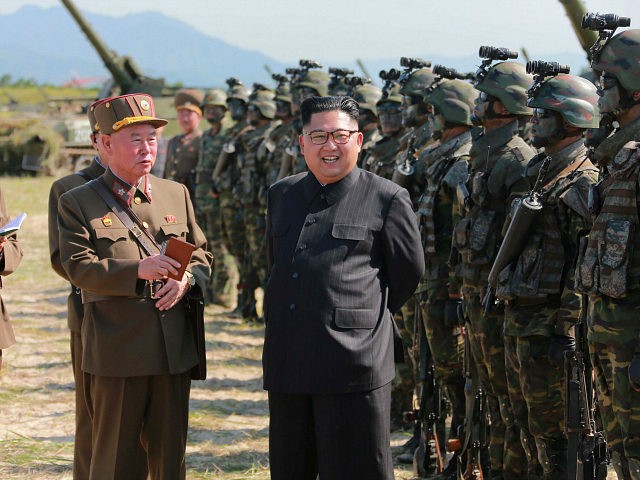If the South Korean analysts quoted by Yonhap News are correct, North Korea will not be having a Happy New Year.
According to the Institute for National Security Strategy (INSS) in Seoul, tough international sanctions imposed against North Korea over its nuclear missile programs haven’t affected the economy much yet, but that is about to change.
“In addition to further toughened sanctions, an increase in North Korea’s investment in conventional forces in the aftermath of military pressure stemming from the (Korean) deployment of American strategic assets is forecast to hit the North Korean economy seriously sometime after March next year,” the Institute said.
“March has been pinned for the timing for the (United Nations Security Sanction) Resolution 2375 adopted in September to take effect, given the U.N. sanctions committee’s position that the effects of sanctions begin to be seen six to twelve months after their introduction,” the statement added.
The INSS made a bold prediction that should soon be put to the test: North Korea might make some belligerent statements about continuing its nuclear program even as the economy falters, but will, in fact, use the 2018 Winter Olympics in Pyeongchang to open a constructive dialogue with South Korea.
U.S. and European policymakers have likely been gambling that the worst pain from sanctions would come in a delayed reaction that takes months to push its way through North Korea’s economy, as the South Korean analysts projected.
As the end of 2017 approaches, many observers have concluded North Korea was able to evade the most damaging sanctions or ensure the brunt of the suffering is taken by the captive population, while the military keeps its funding and the elites of Pyongyang continue to enjoy a comfortable lifestyle.
For example, the Financial Times (FT) argues that North Korea’s economy is much stronger than commonly believed, and the regime’s callous disregard for the welfare of its people has rendered even the toughest sanctions “toothless.”
Furthermore, FT suggests North Korea is actually in the midst of a complex multi-stage plan to slip out from under China’s patronage and establish stronger bilateral relations with America. The idea is that Kim will monetize his nuclear missiles as diplomatic leverage and cut some sort of a deal when he has reached his maximum strength with relation to the United States (i.e. he can credibly threaten to bomb Washington, DC). He will bring not only nuclear weapons but an economy strengthened by a careful infusion of capitalism to the table.
The contrary view is that it simply takes time for the blow dealt to North Korea by international sanctions to get through the communist nation’s primitive economic nervous system and cause real pain in Pyongyang.
Sanctions evasion is still a major problem, of course, which is why the United States just presented a draft resolution to China at the United Nations calling for the screws to be tightened against Kim Jong-un even further. The United States specifically wants U.N. assistance to thwart North Korean efforts to bypass sanctions by using merchant ships to transport banned goods.
Another tactic North Korea might be exploring to work around sanctions is cryptocurrency manipulation. The Trump administration formally accused North Korea of perpetrating the WannaCry cyberattack in May, confirming suspicions long held by security analysts.
The hackers behind the WannaCry virus demanded their ransom in bitcoin, which Forbes noted on Tuesday has become an item of great interest to North Korean planners. Pyongyang has been running aggressive Bitcoin mining operations for at least half a year – beginning right about the time WannaCry broke out – and may have developed techniques for hacking the cryptocurrency.
“Bitcoin’s stateless nature makes it very attractive to North Korea, as the cryptocurrency is essentially sanctions-proof,” explained Park Strategies consultant Sean King. “By contrast, the U.S. dollar’s standing as the world’s reserve currency, apparently favored by even rogue regimes like North Korea’s, gives America uniquely extraterritorial power when enforcing its sanctions. That’s because we can largely deny sanctioned entities’ use of the dollar by cutting them off from the U.S. banking system.”
In essence, then, we have a multi-way race between the delayed catastrophic effects of tough sanctions predicted by South Korean analysts, the Kim regime’s mad dash for the nuclear missile finish line, and North Korea developing financial techniques and international relationships that will make sanctions permanently ineffective.
One other factor to consider is that if sanctions do wallop North Korea hard in 2018, the situation will likely become a contest of wills between Western governments determined to prevent nuclear proliferation and humanitarian agencies. Kim will not hesitate to use his own people as hostages, which will expose the great weakness of international sanctions: they aren’t really the bloodless instrument of international pressure that politicians see them as.
Indeed, concerns have already been voiced by humanitarian agencies about the toll sanctions are taking on North Korean civilians. Those objections will be raised even more loudly if the Institute for National Security Strategy is correct, and 2018 sees a delayed-reaction meltdown in the North Korean economy.

COMMENTS
Please let us know if you're having issues with commenting.